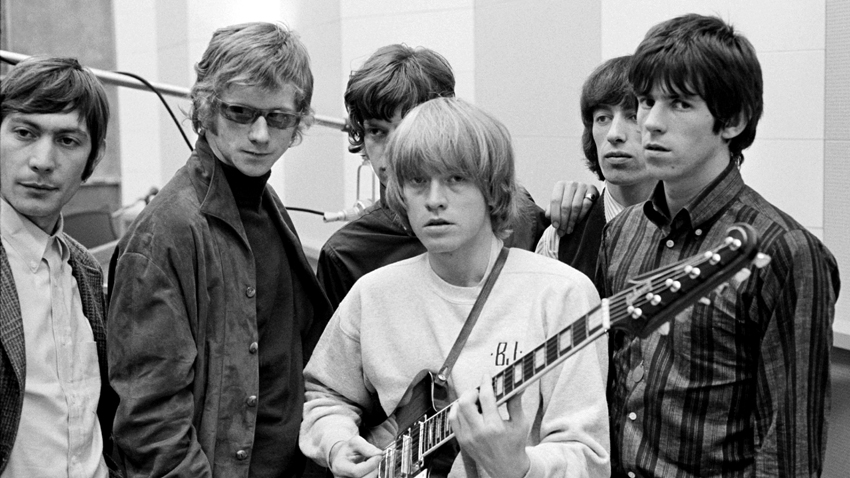
Want all the hottest music and gear news, reviews, deals, features and more, direct to your inbox? Sign up here.
You are now subscribed
Your newsletter sign-up was successful
A hustler is only as good as his hustle, and in 1963, 19-year-old Andrew Loog Oldham hit the mother lode. On the night of 23 April of that year, the budding teen tycoon, having already successfully hawked himself to fashion designer Mary Quant and Beatles manager Brian Epstein as a happening hipster who knew a thing or two about a thing or two, walked into the Crawdaddy Club in Richmond, England, and saw a six-piece blues band that had everything he needed to capture the zeitgeist of the '60s.
Well, almost. Oldham made some key tweaks to the Rollin' Stones to ready them for mass consumption, such as convincing the group to add an all-important "g" to their name and dropping piano player Ian Stewart from their onstage lineup; and then there was the matter of the band's songwriting - which was nil. Oldham famously locked Mick Jagger and Keith Richards in a room until they had a self-penned gem (Tell Me) worthy of inclusion on the Stones' debut album.
That Oldham scored his boys a record deal at a better royalty rate than The Beatles, showing up his onetime employer, Epstein, quickly cemented his status as a shrewd dealmaker. But he had a true ear for the music, as well, and unlike Epstein, who was an awkward, sometimes unwelcome presence in the studio with The Beatles, Oldham produced all of The Rolling Stones' albums until 1966's Between The Buttons.
Oldham's parting with the Stones in 1967 was about as messy as those things usually go, and for most of the next few decades, it looked as if his final chapter had been written - it wasn't until the '90s that he kicked the drug habit that almost kicked him. His personal and public rehabilitation - a veritable phoenix rising from the ashes - began with a pair of crackling autobiographies, 2002's Stoned and 2003's 2Stoned, which soon led to what he jokes is his "first regular job," DJing for Steven Van Zandt's Underground Garage on SiriusXM.
Coinciding (coincidentally) with The Rolling Stones' 50th anniversary celebrations of last year, Oldham, who has made Bogota, Columbia his home since the mid-'80s, is back in the limelight now more than ever with two fascinating offerings. There's Charlie Is My Darling, a 1965 documentary of the Stones (originally produced by Oldham and directed by Peter Whitehead) that captures the group in a mini tour of Ireland with an intimacy that approaches poetic voyeurism; and next we have Stone Free, his third book, an immensely entertaining examination of the bigger-than-life show-biz masters (Epstein, Larry Parnes, Phil Spector, Albert Grossman, among others) who paved the way for him. (You can order Stone Free, from Escargot Books, right here.)
In the following interview, conducted via e-mail, Oldham holds forth on a variety of topics: some of the legends he profiled in Stone Free, the difference between impresarios and "pimpresarios," how he came to film the Stones, working with the band in the studio, what Jagger-Richards songs he wishes The Beatles would have covered and much more.
So Wikipedia calls you, among other things, an "impresario" - which I guess you were at one time. Is that how you saw yourself?
Want all the hottest music and gear news, reviews, deals, features and more, direct to your inbox? Sign up here.
"Never did. Impresarios were old farts in an old game. Anyway, an impresario usually refers to fellows - or gals - who present something, an attraction to the public at a specific venue. My venue was somewhere between ether and the world."
As opposed to "impresario," undoubtedly you'd prefer your own term: "pimpresario." The prefix gets a bad rap, but you don't see it that way, do you?
"No, I think if we strip away the protective layer to all our functions, eventually the two functions of pimps and whores are applicable, and that fact appreciated, a lot of the crap gets removed, and life is simple. Priests are pimps for Jesus, and lawyers are whores for the judge and/or their clients. And they are supposed to be the icing on the toxic cake we all want slices of."
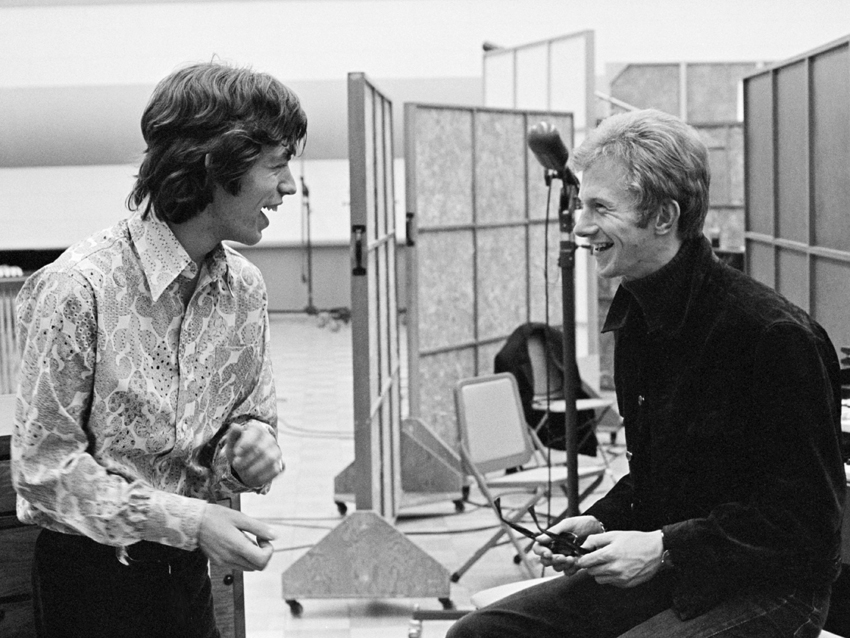
Oldham shares a laugh with Mick Jagger. © BobBonisPhotographs @2269 Productions, Inc. - NotFadeAwayGallery.com
Are there any current "pimpresarios" who remind you of yourself in the '60s?
"Tough. The guy who manages Justin Bieber, maybe - he should be. They did a great thing with that Canadian girl Carly Rae something… Jespen? He also got - I mean the manager - criticized for doing an interview with either Rolling Stone or the New York Times. Taking space away from the act can be fatal for a manager, although maybe Bieber doesn't mind him talking to the old folks.
"There is a big difference between the times and people I write about in Stone Free. Back in the '60s, in the beginning, a manager spoke for his act. Now, in this hurdy-gurdy, space-slurping tech world we function in, an artist is required to be able to promote themselves, to be able to handle all aspects of the selling and the media. JD Salinger would not get a deal.
"It's whores again. The selling is 90 percent of the gig. The manager is the bean counter and the bad guy. In the beginning, I had to shout about the Stones or Marianne Faithful or whomever. The act just did the playing and singing. Now they all have to do it all from the giddy-up. The public is not interested in the bean counter unless he marries the act's mum."
You also don't have a problem with the word "hustler." But what about a bad hustler, one who is unskilled or not transparent enough? Is there some degree of shame in being a clumsy hustler?
"Well, once upon a time, the art of hustle was given to a precious few. Then it was adopted by the gelled, four-buttoned majority malaise. They would say, 'I hustled him, because they preferred that to the truth: 'I fucked him.' They got it wrong. A good hustle and a good hustler leave no victims."
You've also been described as an "enfante terrible" of the London pop scene. Accurate? Did you enjoy your notoriety?
"Sure did. Nothing like that French tab. It meant you were not toeing the line, following the party orders, refusing to be suppressed into the ordinary."
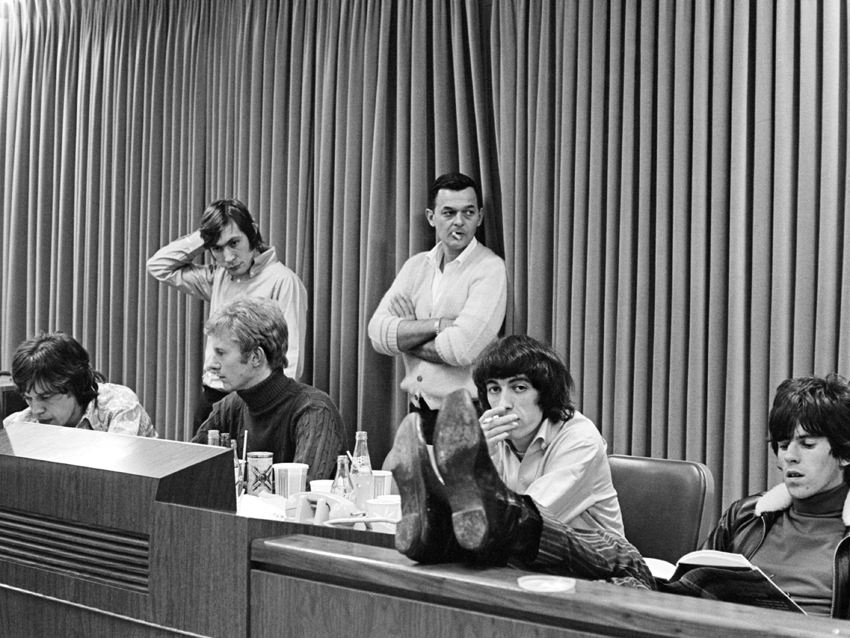
Oldham (seated) and engineer Dave Hassinger (standing) in the studio with the Stones. © BobBonisPhotographs @2269 Productions, Inc. - NotFadeAwayGallery.com
Let's get into Charlie Is My Darling. How did it come together initially? Was the intention to get the band more comfortable in front of the cameras, with an eye of doing theatrical films, such as A Clockwork Orange?
"Completely. It was a screen test for the Stones made via our own private studio - i.e. my producing it and therefore controlling how or if it was seen. I wanted the Stones to get used to the cameras, and I wanted to see which one of them the camera took to. The most impressive was Charlie Watts, hence the title."
Why wasn't the film released at the time? I imagine that it would've been very well received.
"Where? It certainly would not have done business in the cinemas. A couple of art houses maybe, but it would not have been worthwhile, and in addition, it would have been contrary to our agenda. We were now having hits. On top of that, the other avenues supposedly open to us were not - the BBC, etc. The establishment still loathed the Stones and hoped we'd go away."
Charlie was filmed around the same time as the Dylan doc Don't Look Back. Were there any rock or pop documentaries you used as a reference? The art form was still in its infancy.
"Not really. If anything, French cinema influenced me - the tackiness of Godard. But it was not really in my hands - Peter Whitehead was filming it - so you really have to stand back and let him get on with it."
The scene with Mick and Keith working on Sittin' On A Fence - is that typical of how their songwriting sessions went at the time? You're with them in the room - what kinds of opinions or suggestions would you offer?
"It was not typical because there were cameras in the room. I don't think I offered suggestions on many occasions. On As Tears Go By I did for sure. Generally, I just offered enthusiasm and belief in their ability to become the writers they became."

Andrew Loog Oldham, 2012. © Betina La Plante
The footage of the band backstage is surprising in how innocent everything seemed. The group tunes up, puts on a bit of makeup, signs an autograph for an elderly woman - by '72, things would be quite different.
"Wouldn't it just? That's part of what makes Charlie such an original and special item. It is of the time. The '60s in ' 65 was a small club. 1972 is really another chapter of the '60s with a whole lot more of the world joining in."
As depicted in the film, the fans at the shows went absolutely crazy - rushing the stage and literally attacking the band. Were the Stones ever concerned for their safety?
"No."
The picture shows the group being absolutely on fire on stage. Did they ever express irritation that people weren't listening to them at concerts?
"Not that I recall. As long as they bought the records, I suppose. They could listen at home and scream at the shows."
Brian's demeanor in the film doesn't really suggest the enormous problems he would soon have. He seems happy and engaged. Did you sense that trouble could be around the corner for him?
"Have a look at it again. That's not happy."
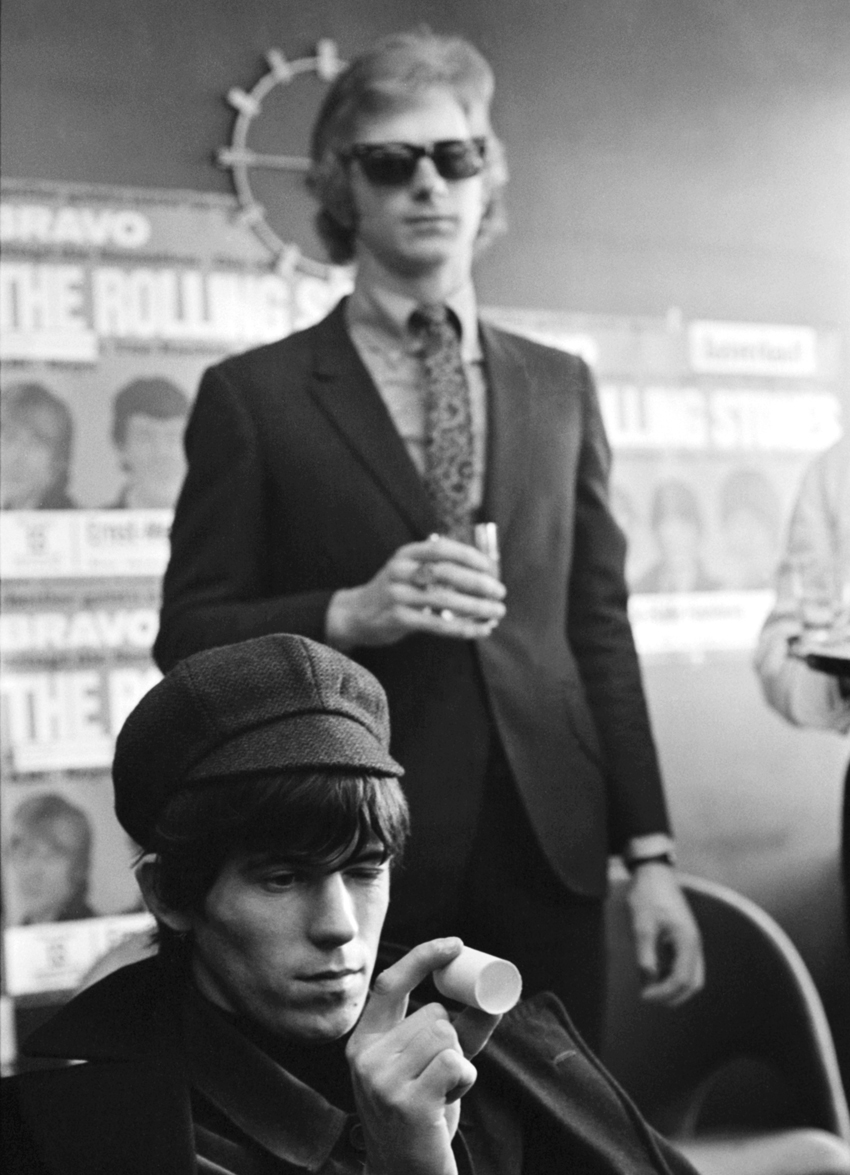
"I was inspired by the Stones," says Oldham, seen standing behind Keith Richards. "I served that inspiration." © BobBonisPhotographs @2269 Productions, Inc. - NotFadeAwayGallery.com
You had a huge interest in a film version of A Clockwork Orange starring the Stones. How far along did that ever get? Was the band all on board?
"It didn't. I never even got my foot in the door. The rights were in the hands of lawyers who sold it to Kubrick who fancied Malcolm McDowell who fancied himself."
What went into your decision to cast the Stones as the "anti-Beatles"? Was there a definite anti-Beatles faction in England at the time? I always thought it was possible to like both groups.
"I didn't. That is a particular misconception that is unfortunately promoted today by the Stones. Maybe they have bad memories. The Beatles were The Beatles - the Stones were the Stones, and as you say, a lot of folks liked both. I've seen Mick and/or Keith both say that I cast them against The Beatles. Not true. I cast them as they were. I had more respect for the Stones than to compare them to something else."
On early records, The Beatles were looking to Motown, The Beach Boys and Dylan. Who were the Stones looking to as either competition or inspiration? Who were you inspired by?
"Who I was inspired by did not enter the picture. I was inspired by the Stones. I served that inspiration. My own private inspirations were not appropriate except as a force of energy for me to use."
On the band's debut album, Phil Spector is credited as playing maracas on Little By Little. Did he offer any production advice or insights?
"He advised me to own the masters - good advice. He also played a great bass on Play With Fire."
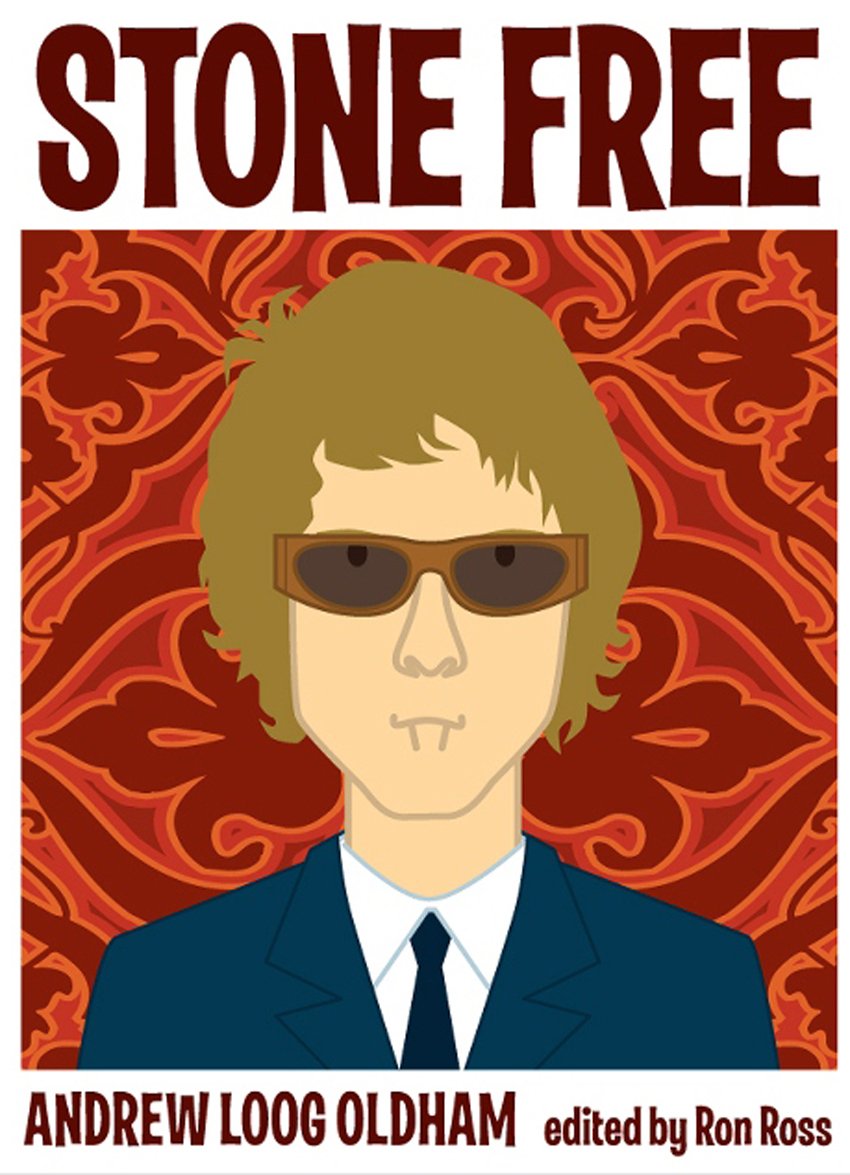
Mick and Keith became the songwriters, but what was the relationship between Keith and Brian as guitarists? When they got in the studio, did they have fun playing together?
"You can hear it. During the two periods they enjoyed playing together the results were magic. The in-between period was pretty good as well - Between The Buttons, for example."
Your poetry for the album December's Children - what did the band think of it?
"I never asked."
Although Aftermath had some great singles, it's the first album that really feels like just that - an album. Was the group starting to think of the album as a sophisticated piece of art unto itself rather than just a collection of singles?
"The Stones always attempted and, on most occasions, succeeded in making the three parts of the art seamless and respectful of each of them - the road, the records and the presenting of themselves in the media. Most bands did not have their hands on the pulse of all three."
What went into the decision to record Aftermath in California?
"That was our new recording home, RCA on Iver and Sunset. Great time, great Dave Hassinger, great Jack Nitzsche, great weather."
The song Goin' Home is over 11 minutes long. Was that precedent setting for the time?
"It just sounded right to keep it going at the time, in that moment, and luckily Charlie saw me waving and kept it going."
Back to your book - in one passage, you mention being impressed by the "profundity of superficiality." That seems like a contradiction...
"I was told by my book editor that I never met a cliché I did not embrace. I also like a question of opposites. Opposites attract."
One of the master hustlers you write about is ballet impresario Sergei Diaghilev - how do you think he would have fared in rock 'n' roll?
"I think he fared very well. There's something of the wild card in Epstein, Parnes, McLaren, Jerry Brandt and a couple of Americans I did not write about - Artie Ripp and the who sold Bruce Springsteen to John Hammond at CBS. I nearly forgot his name, a great disservice - Mike Appel. Now, boy, he had as much faith in Bruce as Diaghilev did in Nijinsky or Erte or Stravinsky.
"Kit Lamber's father composed and conducted for Diaghilev. Now, where Kit and Chris Stamp showed The Who what could be was quite amazing. We were all looking over our shoulders when that mob showed up."
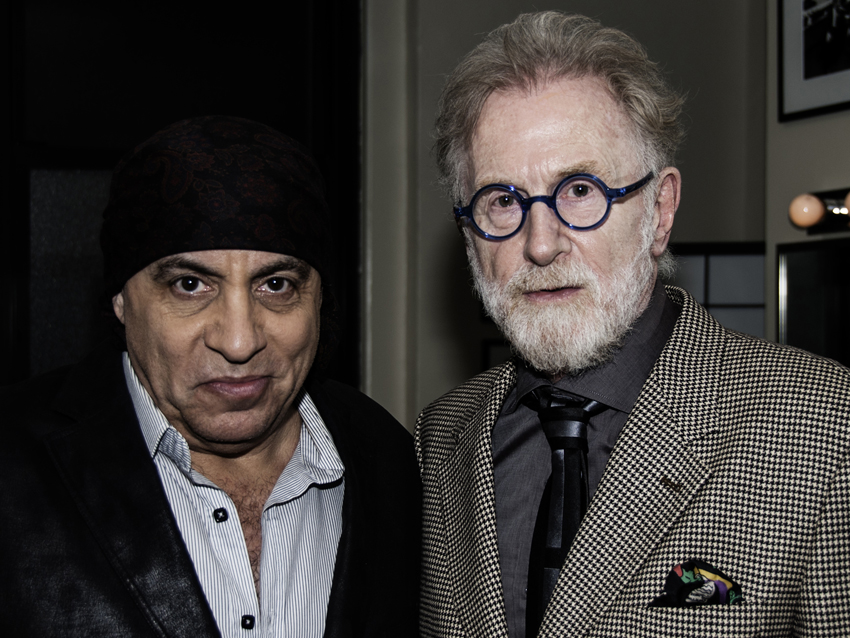
With Underground Garage maven Steven Van Zandt, 2012. © Betina La Plante
Pauline Kael compared the first screening of Last Tango In Paris to the debut of La Sacre du Primtemps, the latter of which Diaghilev presented. Both events disturbed audiences deeply - like rock 'n' roll used to. Do you think we're incapable of being shocked by art anymore?
"I was shocked by Kanye West on the 12-12-12 thing, but I think that's not the shock you are looking for. Lady Gaga at the Grammys a couple of years ago - that yellow theme was just amazing. The problem with rock 'n' roll being able to shock us is that there is no school on the road anymore. You gotta deliver all at once, so pop will triumph over rock.
"Do we realize how many state fairs Elvis played before he did The Steve Allen Show? A whole slew. Same with The Beatles in Hamburg. Who's the last band that did that gruel? The Police? I'm not talking about stuff like Dave Matthews - that's like Woody Herman or Glenn Miller."
You write about Malcolm McLaren, who said that "anybody can be a Sex Pistol." Do you think he was being intentionally ironic? Surely, you wouldn't have said that "anybody can be a Rolling Stone."
"We must remember that not being able to play was an inherent part of the Sex Pistols' makeup. With the Stones, the opposite was true… and they wore makeup."
You claim that integrity bothered Albert Grossman. Yet he fought fiercely for Dylan's artistic freedom. Something of a paradox?
"Did I? In those words? Well, he could not tell Dylan to go out and shoe-shuffle and sing Louis Prima songs, so he saw the glove that fit Dylan and wore it. That involved fighting folks to allow his artist to do whatever he wanted.
"Dear Albert gave that same advice to a lot of acts who were not as strong, as focused, as viable as Dylan, and it's tough to recall their names. Some acts need to be told what to do, and that's not a put-down, though as a gig it's pretty unrewarding."
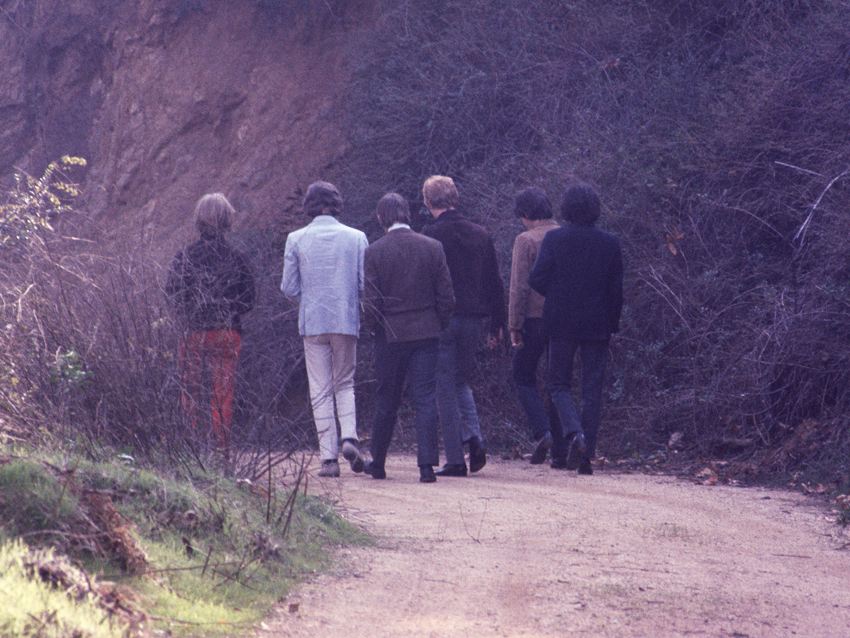
"I've seen Mick and/or Keith both say that I cast them against The Beatles," says Oldham. "Not true." © BobBonisPhotographs @2269 Productions, Inc. - NotFadeAwayGallery.com
The names that Larry Parnes gave to his stable of stars - Billy Fury, Vince Eager, Lance Fortune, etc. - did they seem cool or silly at the time? I guess Dickie Pride got the best or worst name, depending on one's point of view.
"Dickie Pride had talent, and so did Duffy Power. Both came out of the jazz and R&B cycle. Bully Fury was James Dean. It's not any different from Fabian, is it?"
Your chapter on Phil Spector is riveting and heartbreakingly personal. You don't take a stand on his guilt or innocence, but for a lot of us, when we heard the news of Lana Clarkson's murder, it didn't come as a big surprise - it's as if we expected it. Has the tragic myth eclipsed the music?
"I always say that come Christmas I won't play Phil's Christmas album, for obvious reasons. But come Christmas, Ella is always good, The Beach Boys have managed to remind us what facile and juvenile pricks they are, so it's always back to Phil. C'mon - Darlene Love saying, 'But it's December the 24th and I'm longing to be up north' puts a pop lump in my throat and a tear in my eye every year."
You related quite strongly to Tony Curtis' character, Sid Falco, in Sweet Smell Of Success. Where there any real-life JJ Hunsecker's in your world?
"Interestingly, yes. John Stephen, the king of Carnarby Street clothing stores. I went into a meeting with him when I was 17, unprepared. He took no pity on my age. He just snarled and spat me out on the street for wasting his time and not coming up to what being in a room with him required. An important, very important lesson that I'll never forget."
Last question, and it's on the Stones: The band famously covered I Wanna Be Your Man. Tell me, which Jagger-Richards song would you have loved to hear The Beatles cover?
"Great question. Never been asked that in my life. Paul McCartney could do a tremendous Ruby Tuesday, and George could have done a great She Smiled Sweetly. John Lennon doing 19th Nervous Breakdown. I was going to suggest Something Happened To Me for Ringo, but without Richard Perry?"
Joe is a freelance journalist who has, over the past few decades, interviewed hundreds of guitarists for Guitar World, Guitar Player, MusicRadar and Classic Rock. He is also a former editor of Guitar World, contributing writer for Guitar Aficionado and VP of A&R for Island Records. He’s an enthusiastic guitarist, but he’s nowhere near the likes of the people he interviews. Surprisingly, his skills are more suited to the drums. If you need a drummer for your Beatles tribute band, look him up.
